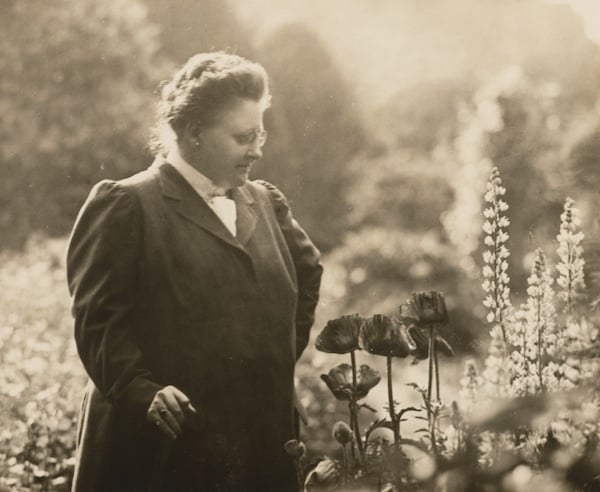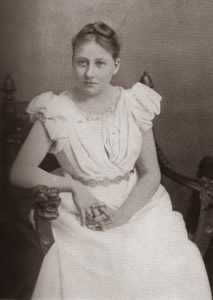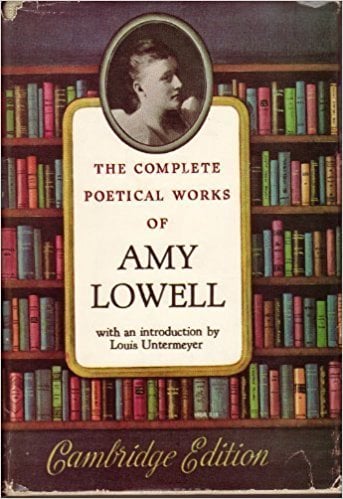Amy Lowell, American Imagist Poet
By Nava Atlas | On June 27, 2013 | Updated August 25, 2024 | Comments (0)

Amy Lowell (February 9, 1874 – May 12, 1925) was an American poet known for a form of poetry called Imagism. The product of a wealthy Brookline, Massachusetts family, she was educated privately and spent part of her youth traveling abroad.
She started life as a pampered debutante, but her accomplishments and dedication to her craft eclipse her privileged beginnings. In addition, she’s now celebrated as a rediscovered lesbian poet.
Most of all, she’s remembered as an Imagist poet, which, according to her was defined as the “concentration is of the very essence of poetry” and aimed to “produce poetry that is hard and clear, never blurred nor indefinite.”
Europe and influences
Lowell’s family discouraged their female members from attending college, so she read avidly to make up for her lack of formal education. Her first collection of poems, A Dome of Many-Colored Glass, was published in 1912 to a tepid response. At around this time, she met her life partner, Ada Dwyer Russell, an actress.
A trip to Europe brought her into contact with poet Ezra Pound who was both an influence on her work, and also a critic of it — he believed that she somehow usurped the imagist movement.
Pound had already broken off from the Imagist poets, and after his encounter with Lowell, called it”Amygism” — not meaning to be complimentary. Because she was heavy, she had to endure the taunts of her contemporaries — Pound called her “Hippopoetess.”
Despite her inauspicious beginnings as a published poet, Lowell saw more success as her career progressed. Her poetry was widely published in magazines and other publications. Sword Blades and Poppy Seed (1914), a collection of poems enjoyed much favorable attention, as did her collection of literary criticism, Six French Poets (1915).
. . . . . . . . .

. . . . . . . . . .
Immersed in a world of poetry
Lowell was completely immersed in the world of poetry in all its aspects. According to Elaine Showalter in A Jury of Her Peers:
“An admirer of Charlotte Brontë and a biographer of Keats, Lowell was sure that the years before the war were ‘the beginning of a great poetic renaissance. Including Frost and Sandburg as well as H.D., the poetic upheaval of 1912 – 1913, she believed, was based on the determination ‘to voice America’ and ‘drop the perpetual imitation of England.’
Rejecting love poems in favor of daily life, a wide and sparkling canvas, the new voice was, ‘whether written by men or women … in essence masculine, virile, very much alive …
Lowell’s contemporary reputation mainly rests on her rediscovery as a lesbian poet, but she was also an antiwar poet of some distinction. ‘It is impossible for anyone writing today not to be affected by the war … It has overwhelmed like a tidal wave.'”
. . . . . . . . . .
Amy Lowell at age 16
. . . . . . . . . .
Tirelessly promoting, constantly writing
Lowell was known for her forceful personality and flamboyant habits, which included smoking cigars and using radical language.
Her energy was legendary — she lectured tirelessly to promote poetry, and wrote ceaselessly — in addition to more than 650 poems, she wrote numerous essays, as well as works of criticism and translation. T.S. Eliot called her “the demon saleswoman of poetry.”
Other collections included Men, Women, and Ghosts (1916), and What’s O’Clock? (1925). The Penguin Companion to American Literature describes her work as follows:
“Versatile rather than original, scintillating rather than substantial, her poetry lacks the firmness and concision advocated by Imagist theoreticians, and is in fact less Imagistic than impressionistic. Self-consciously exotic and extravagant, it is ablaze with flowers and rich fabrics.
Although a devoted New Englander, she would often wander nostalgically to pre-Revolutionary France or to a never-never land. She possessed an amazing facility for rhyming, but her characteristic form is an unrhymed free verse. She also experimented with polyphonic prose, and intermittently rhymed prose-poetry.”
. . . . . . . . .

. . . . . . . . .
The legacy of Amy Lowell
Lowell suffered from a glandular disorder that caused many health problems, and in 1925, died at age 51 of a cerebral hemorrhage. In 1926 she won a posthumous Pulitzer Prize for Poetry, for What’s O’Clock, published the previous year. Her Complete Poetical Works wasn’t published until 1955.
Lowell’s work faded from favor for some time, but the women’s movement of the 1970’s brought renewed attention to her work. One critic, Richard Aldington, summed up her legacy: “In Amy there was something of an artist and a real aesthetic appreciation.”
. . . . . . . . . .
. . . . . . . . . .
Quotes by Amy Lowell
“All books are either dreams or swords, you can cut, you can drug, with words.” (Selected Poems of Amy Lowell, 1928)
. . . . . . . . . .
“Polyphonic prose is a kind of free verse, except that it is still freer. Polyphonic makes full use of cadence, rime, alliteration, assonance.” (Preface of Can Grande’s Castle, 1921)
. . . . . . . . . .
“Even pain pricks to livelier living.”
. . . . . . . . . .
“Sexual love is the most stupendous fact of the universe, and the most magical mystery our poor blind senses know.”
. . . . . . . . . .
“Art is the desire of a man to express himself, to record the reactions of his personality to the world he lives in.”
. . . . . . . . . .
“Don’t ask a writer what he’s working on. It’s like asking someone with cancer on the progress of his disease.”
. . . . . . . . . .
“It has, I think, every cliché and technical error which a poem can have, but it has loosed a bolt in my brain and I found out where my true function lay.” (on her first poem, Oct 21, 1902)
. . . . . . . . . .
“In science, read by preference the newest works. In literature, read the oldest. The classics are always modern.”
More about Amy Lowell
On this site
- Lowell on Her “Vers Libre” Poetry
- Lowell on How a Poet Learns the Craft
- 10 Iconic Poems by Amy Lowell, American Imagist Poet
Poems (full texts)
Major Works
- A Dome of Many-Coloured Glass (1912)
- Sword Blades and Poppy Seed (1914)
- Men, Women and Ghosts (1916)
- Can Grande’s Castle (1919)
- Pictures of the Floating World (1919)
- Legends (1921)
- Fir-Flower Tablets (1921)
- What’s O’ Clock (1925)
- East Wind (1926)
- Ballads for Sale (1927)
Collected poems
- The Complete Poetical Works of Amy Lowell, with an introduction by Louis Untermeyer (1955)
- Selected Poems of Amy Lowell, ed. by Melissa Bradshaw and Adrienne Munich (2002)
- Amy Lowell: Complete Poetical Works and Selected Writings in 6 vols, ed. by Naoki Ohnishi
Biographies
- Amy Lowell, American Modern by Melissa Bradshaw and Adrienne Munich
- Amy Lowell Among Her Contemporaries by Carl Rollyson
- Amy Lowell Anew: A Biography by Carl Rollyson
- The Letters of D.H. Lawrence and Amy Lowell 1914-1925
by E.Claire Healey and Keith Cushman
More Information
- Works by Amy Lowell on Project Gutenberg
- Poetry Foundation
- Lowell Scholarship for American Poets
- Reader discussion of Lowell’s works on Goodreads
- Audio recordings on Librivox
- Wikipedia
Visit
- Amy Lowell’s Grave – Mount Auburn Cemetery, Cambridge, MA


Leave a Reply